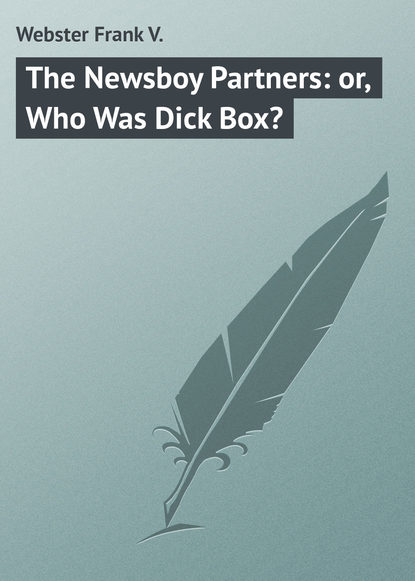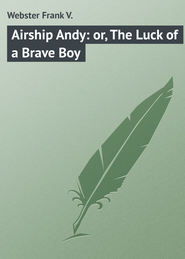По всем вопросам обращайтесь на: info@litportal.ru
(©) 2003-2024.
✖
The Newsboy Partners: or, Who Was Dick Box?
Настройки чтения
Размер шрифта
Высота строк
Поля
"What have I done?" asked Dick.
"Youse is takin' all me customers away."
"I didn't do anything to induce that man to buy of me."
"Yes, youse did."
"What did I do?"
"Well, I don't know what it was, but youse has got t' git outer here. Dis is me stampin' ground, an' I want youse t' git."
"Suppose I don't?" asked Dick, who was not afraid, even if Bulldog was the larger.
"Well, you'll see. Who are youse, anyhow? Comin' t' N'York an' buttin' in here where youse ain't wanted. Why don't youse go back home?"
"I would if I knew where my home was," spoke Dick quietly, for he made no secret of his queer plight.
"Say, kid, honest, don't youse remember anyt'ing about yerself?" asked Bulldog with a sudden assumption of friendliness, for he happened to remember the conversation he and Mike Conroy had had concerning Dick, and he thought this a good chance to further the plot which the two had made.
"I can remember very little about what happened before I met Jimmy Small."
"Don't youse know what kind of a place youse lived in?"
"I haven't the least idea."
"An' can't youse remember yer own name?"
"Only the first part of it."
"Well, dat's a queer go! Would youse like t' git back home, kid?"
"Indeed I would. Why, do you know anything about me? My mind seems in a daze whenever I try to think about it. If you know anything, please tell me."
"Naw, I don't know nuttin'. Say, youse didn't run away, did youse? Youse ain't comin' no game like dat, is yer?"
"No, certainly not," replied Dick, his face flushing at the insinuation.
"Well, dat's queer," murmured Bulldog as he turned away. Then he started suddenly as he saw coming toward him a man whom he knew. It was a detective from police headquarters, and Bulldog had frequently given the man information about petty thieves.
"Say," said Bulldog in a low tone to the detective as the latter reached him, "I want t' ask youse a few questions. Come in here," and he motioned to a hallway. The detective, who was inclined to be friendly with the newsboy, thinking he might have some future use for him, complied, and soon the two were in conversation.
CHAPTER XIV
JIMMY'S FURTHER PROGRESS
Meanwhile Dick, all unconscious of the plot being woven about him, continued to sell his papers. When he was out he went to the delivery wagon and got more, and he remained in the financial district until three o'clock, when, as that marks the close of the day's business, there was not much chance to sell any more papers.
Then he went up to report to Jimmy and help him dispose of his stock by circulating around City Hall Park and the streets leading to the ferries.
"Well, dis ain't so bad," remarked Jimmy as they went to supper that evening, calculating on the way how much they had taken in.
"No, indeed," said his partner. "If this keeps on we can soon start a regular stand."
"Crimps! Dat would be fine! But I guess we'll have t' have more money saved up. All de good places is taken, and we'd have t' buy somebody out."
"Oh, yes, we'll have to have more money," agreed Dick. "But if all goes well we can put another dollar in the bank this week."
"Dat's de stuff. Crimps! but I'm hungry! Guess I'll have a – " Jimmy stopped suddenly as he put his hand in his pocket.
"What's the matter? Lost your money?" asked Dick anxiously.
"Nope. I was jest goin' – jest goin' t' smoke a cigarette, but I forgot – "
"I'm glad you remembered in time. Do you find it hard to give them up?"
"It's kinder hard – jest now."
"Then come on, let's hurry up and have supper and you'll not think of smoking."
"All right," Jimmy agreed, but it was quite a struggle for the lad. The cigarette habit had taken more of a hold on him than he supposed, and he felt that he must smoke. But he determined to keep his word, and as he was a boy of some strength of character, in spite of his surroundings, he did not readily give in to the temptation.
After supper the reading lesson was resumed, and Dick also began to instruct his pupil in the mysteries of writing. It was not easy work, but Dick was not discouraged.
Jimmy had one merit, he really wanted to learn; for he was sharp and shrewd, and he saw what an advantage it was to Dick to be able to read and call out intelligently the items of news. In this way Dick could sell as many papers as could Jimmy, and with half the effort, for Jimmy made himself hoarse with his frequent cries of "Wuxtry!" Then, too, Jimmy was aware of how much better off he was since he had formed a partnership with Dick. He actually had money in the bank, a thing he never dreamed of before, and he had a good room, which formerly was such a rare occurrence for him that he could count on the fingers of one hand the number of times it had happened since he had had to shift for himself. So Jimmy determined to do his best to learn to read and write.
In a week the newsboy knew the alphabet, and could spell a few simple words. The writing came slower, but he was making progress.
Then another improvement took place. As he learned to spell the words he also learned how to pronounce them correctly. He saw that "the" spelled a different word from "de," as he was accustomed to pronounce it, and he began to practise using "this" and "then" in place of "dis" and "den."
"There!" exclaimed Jimmy triumphantly one night as he looked at a piece of paper. "There's me name!" and he looked at it proudly, for it was written after a severe effort on his part. "Did I speak right den – I mean then?" he asked.
"Very nearly, except that you said 'me name' instead of 'my name', Jimmy."
"Dat's so – I mean that's so. Well, what do youse think of me – I mean my writin'?"
"It's very good; but if you want to speak correctly, don't say 'youse' for you, and put a final 'g' on your words that need it."
"Crimps! but dat's – I mean that's a lot to remember," he answered with a sigh.
"You're not sorry you're learning, though, are you?"
"Betcher life I ain't."
He gave a sudden start.
"I s'pose I shouldn't say that," he added.
"Well, I don't know that it's any particular harm," answered Dick. "It's slang, and when you grow up to be a man I don't suppose you'll like to use slang. The trouble is, as I've read, it's hard to break off the habit. So I suppose it's best to start young."










